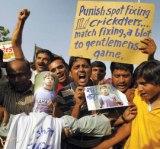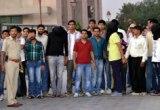Archives
The other name Of cricket is tragedy
The Delhi Police on May 16, 2013 shared excerpts of the intercepted calls recorded between the cricketers and the bookies. During a purported conversation between off-spinner Ajit Chandila and a bookie named Amit, they arrived at an agreement and Chandila allegedly gave his consent for spot-fixing during the May 5 match with Pune Warriors in Jaipur.
The second conversation, quoted by the Police Commissioner allegedly took place between S. Sreesanth’s aide Jiju Janardanan and a bookie named Chand prior to the May 9 match between Rajasthan Royals and King’s XI Punjab in Mohali.
The third alleged conversation cited by the police was between Chandila and another Rajasthan Royals player Ankeet Chavan to finalise the deal.
 The three of them were arrested from different locations in Mumbai. The real ignominy was not with the arrest and the disgrace associated with the cricketers alone. The real tragedy is perhaps with further findings on the issue – right from the strong indication of underworld involvement from overseas and also suspicion that call girls would have been used to tap the ‘potential fixers’ among the cricketing tribe. It’s a cob-web of deceit and plotting.
The three of them were arrested from different locations in Mumbai. The real ignominy was not with the arrest and the disgrace associated with the cricketers alone. The real tragedy is perhaps with further findings on the issue – right from the strong indication of underworld involvement from overseas and also suspicion that call girls would have been used to tap the ‘potential fixers’ among the cricketing tribe. It’s a cob-web of deceit and plotting.
In this round of fixing, bookies had stuck a deal with the players – all bowlers to give loose balls (as per the diktats of bookies) in an over as decided. The players used ‘towels’ to make signals to the bookies so that they could prepare themselves and make the booking.
Now, for a layman, what’s booking? In cricketing lingo – bookies put in money – say for an over that bowler A would give away 15 runs in this over, and if that happens he makes lakhs if not more.
Cricketers are paid handsomely in return for abiding by the contacts. Earlier cricketers have been found striking similar deals to miss catches or get themselves out when the going is good and critical as a game changer. “Essentially, this is linked to gaming, betting and the inherent human greed. The baser instincts make people indulge in these,” says a Delhi police insider.
 According to Police Commissioner Neeraj Kumar, Chandila was allegedly promised Rs 40 lakh for giving away 14 or more runs in his second over and was paid half that amount in advance. “But he had to return the money as he forgot to signal the bookmakers in time for them to place their bets.” Other codes were tucking in a towel, rotating a watch and wearing a wristband.
According to Police Commissioner Neeraj Kumar, Chandila was allegedly promised Rs 40 lakh for giving away 14 or more runs in his second over and was paid half that amount in advance. “But he had to return the money as he forgot to signal the bookmakers in time for them to place their bets.” Other codes were tucking in a towel, rotating a watch and wearing a wristband.
During the game against Kings XI Punjab, for instance, Sreesanth tucked a towel into the waistband of his trousers before his second over to signal the bookies and also did some stretching, allegedly to give them ample time to place heavy bets. “Sreesanth had ended up giving away 13 runs against the agreed to 14, but was still paid Rs 40 lakh,” says DCP, special cell Sanjeev Yadav.
Now; this is not the first time that spot fixing or match fixing has taken place.
Rotten Basket
So, what does this imply? The entire basket is rotten. IPL probably made cricket more vulnerable as celebrities and Bollywood got involved. However, players say that the outside elements and the big money involvement in the last 20 years have brought in this sordid story for the game of cricket.
‘outside elements’?
 Delhi police sources say that the hawala money racketeers and underworld dons are one such group. Fugitive ‘terrorist’ Dawood Ibrahim’s passion for cricket and gambling, they say, had made him groom a network of gamblers, bookies and fixers who operated out of Mumbai in the 80s and 90s.
Delhi police sources say that the hawala money racketeers and underworld dons are one such group. Fugitive ‘terrorist’ Dawood Ibrahim’s passion for cricket and gambling, they say, had made him groom a network of gamblers, bookies and fixers who operated out of Mumbai in the 80s and 90s.
Taking the definition of ‘outside elements’ further, Delhi cops say Dawood’s and other match-fixers operate under an extremely secretive network involving prominent figures in the world of cricket as well as industrialists and shady businessmen. One Bollywood star has been already arrested in this regard.
So much is the excitement associated with these ‘fixings’ that when IPL was first floated in 2008 bringing in cheer girls and redefining the game in the context of entertainment; the buzz in the air was that the 20 overs game had actually become the ‘Women, Wealth and Wine T20 tournament’. Delhi Police have gone to the extent of saying that the practice of supplying ‘female escorts’ to IPL players is rampant. Delhi Police Commissioner Neeraj Kumar says that women were present with cricketer S Sreeshant and his friend Jiju when they were arrested.
|
|||||||
Final Words:
So, we know that this menace within the game of cricket, historically hailed highly as a gentleman’s game, is likely to continue. But what about the role of the cricket board and its top officials? In the second edition of the IPL held in South Africa, there were gross allegations of Foreign Exchange violations. The Enforcement Directorate one year later issued ‘Red Corner’ in the name of former IPL commissioner Lalit Modi. In 2010 on charges of fund defalcation Lalit Modi was suspended and replaced by Rajiv Shukla, a Congress minister, who interestingly enjoys a good working rapport with NCP chief and former BCCI president Sharad Pawar.
On the day the latest round of controversy surfaced, Lalit Modi questioned the efficacy of the anti-corruption bureau of BCCI. “What has the Anti corruption team been doing? I hope the Board of Control for Cricket in India (BCCI) does not bury this issue,” Modi said.
Here is the most pertinent question - Will the issue be buried and forgotten once again? Match-fixing is truly one cancerous menace that will destroy cricket even as no one really knows who will bell the cat and how. The game of cricket has excited millions of cricket fans across the globe. Now the match-fixing menace has reduced this much beloved game to a saga of deceit and connivance.
